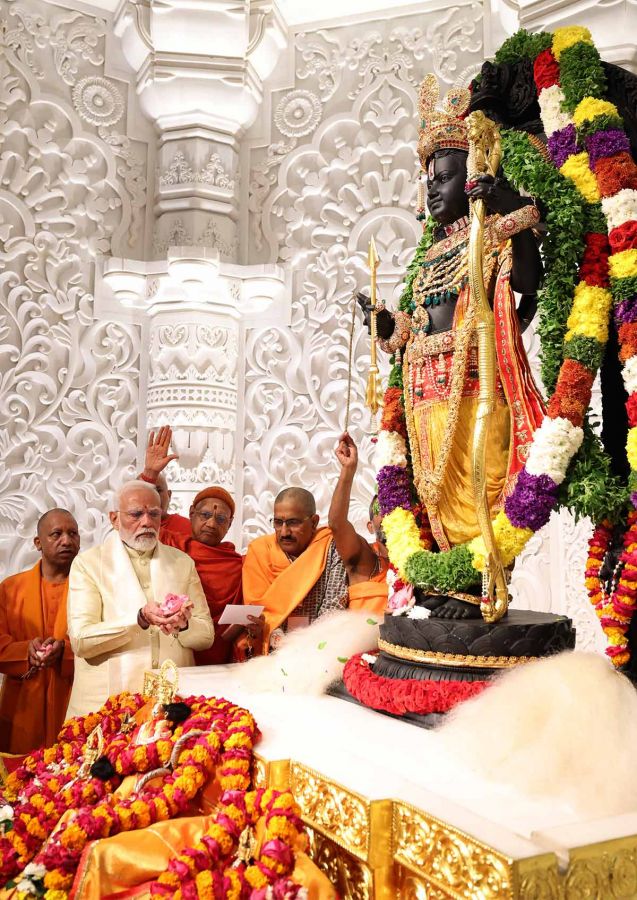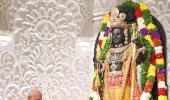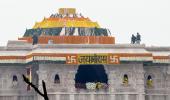'We are very close to become a theocratic State where Hinduism is the official religion of the government.'

The consecration of the Ram Mandir in Ayodhya on Monday, January 22, 2024, was a historic moment in Prime Minister Narendra Damodardas Modi's political career.
Many believe India will never be the same country post January 22 as a programme conducted on such a grand scale is the last nail in the coffin of India's secular State.
It is the first time in India where the head of government in a secular State addressed a gathering from a temple after inaugurating a religious structure which was built on the debris of another structure of another faith.
So what does it mean for India's secularism and its future?
More importantly, what about Indian Muslims? How do they perceive their future in this new India?
Syed Firdaus Ashraf/Rediff.com asked Nilanjan Mukhopadhyay, author of The RSS: Icons of the Indian Right and Narendra Modi: The Man, The Times for his observations of Monday's ceremony and its possible consequences for the Republic.
Was what we saw in Ayodhya on Monday the Bhakti moment of the Hindu faith or the Shakti moment?
You are right, this was the Shakti moment of Hindu society. It was a triumphalist ceremony headed by Prime Minister Narendra Modi. The entire programme was choreographed in a manner to ensure the uniqueness of power projected by Modi himself.
The political choreography was such that it became an occasion of heaping praises on one person, so in a way it was his crowning ceremony amidst the arrival of the deity. The celebrities who had gathered were virtually courtiers for the king.
Prime Minister Modi said Lord Ram will now awaken India's consciousness. What did he mean by that?
Evoking Lord Ram has led to Hindu anger and diluting the tolerance of Hindu society. I only hope he is not trying to raise passions further.
Even when he said Lord Ram is not Agni, but urja (energy) we do not know if this is sheer rhetoric or a message to supporters. That the temple was inaugurated before it was completed indicates that the eyes were on elections.
With developments in Varanasi and Mathura, one does not know if the fire-energy analogy is genuinely heartfelt. This was essentially a political ceremony in the garb of a religious event before the Ram temple is completely built.
We do not know if they are going in for an encore or replay. Is it going to be Ayodhya 2.0 in Varanasi? Those are questions which are extremely worrisome.
Plus the entire approach of reducing India into a monist culture. A single culture, while we have a plural culture. Unity in Diversity is not a mere slogan, but has been a way of life for millions of people for decades.
They have reduced everything to one nation, one people, one religion, one attire, one God, even food.
Monday's event completely blurs the separation of line between religion and politics. This is the first time in my 40 years of journalism that a temple has been used to make a political speech. Modi was addressing the crowd from a temple.
But he was saying the Ram Mandir is meant for peace and prosperity.
You cannot talk of peace and put things in conflict in Varanasi and Mathura and so many places of worship across the country.
If I am not mistaken, the RSS (Rashtriya Swayamsevak Sangh) has said it will not participate actively in the Mathura and Varanasi temple movements.
They have said it, but when people who are part of their political network commit acts they do not act.
Yesterday, a lawyer said he has a list of 16 mosques which were built by destroying temples. He is a responsible member of the Sangh Parivar's legal strategy. When he says they have to demolish 16 mosques, then it means it is the organisational position.
If it is not, then the RSS should have immediately denied his statement. (RSS Sarsanghchalak) Mohan Bhagwat has not said anything about this statement though he did say we do not need to dig up every mosque.
What political benefit will accrue to Modi after the consecration of the Ram temple?
They will try to increase their seats in places where they got a fair amount of votes last time.
The BJP has nearly reached a point of saturation in large parts of the Hindutva belt, which is north, central and western India. They had made some inroads into West Bengal, Assam and Odisha, which we have to see how much of it the BJP will retain. We will also have to see what they will retain in Karnataka.
If Modi's number slides below 303 which he won in 2019, then it will be very difficult for him to pursue the hard nose Hindutva politics that he has been pursuing between 2019 and 2024.
It will be a huge loss of face if the BJP's seats are reduced. And if it increases, then we have to closely look at the changes and direction that would take place in India.

Some people say Monday is the fall of India as a secular nation.
On August 5, 2020 when the foundation ceremony of the temple was done or even on May 28, 2023 when a new Parliament was inaugurated, Modi performed all religious rituals as Yajman (someone who conducts religious rituals). He was invited to do so because he is the prime minister of India.
It also meant that the prime minister of India has become the high priest of Hinduism. We are very close to become a theocratic State where Hinduism is the official religion of the government.
The question then arises where does it leave the religious minorities, the Muslims and Christians in India?
The Supreme Court of India clearly said in its Babri Masjid judgment that land for the mosque has to be given to Muslims in Ayodhya, but they gave the mosque land technically far away from Ayodhya.
What has been done to facilitate building a mosque by the Government of India? Not a single brick has been laid of the Babri Masjid. At any future point of time, if the Babri Masjid is ever built -- which I have my doubts as there will be some problem or other -- but if ever it is built, will the Government of India facilitate the inaugural ceremony of the Babri Masjid the way it facilitated the Ram Mandir's inauguration in Ayodhya?
Will a future prime minister of India participate in the inauguration ceremony of the Babri Masjid if invited by their trust? These are all very important questions.
Modi said we are not lightning a fire but reimagining a new India that is Bhavya Bharat (Grand India).
It is a rhetorical speech because ultimately what is the deciding factor is what happens in your neighbourhood. Right now, in my neighbourhood it is Diwali night minus the fire cracker ban.
What do you think is the future of Indian Muslims?
At the moment I know Muslims are feeling very alienated. They are extremely fearful. I am aware that they have tried to stay close to their loved ones fearing something may happen. They have sent messages to one another stating do not travel in trains or bus.
If you are driving, then ensure do not drive alone. Do not dress up where you will be easily made out that you are a Muslim. Wear religion neutral attire. Those are the messages being passed from one person to another (in the Muslim community). This is not good.
They have no option but to invisibilise themselves.
What is the fear they have if Modi comes to power again?
It is very difficult to say, but the BJP has to realise that social strife is not good for India's economy.
If you continue to alienate people and make people fearful, you never know where a spark gets ignited for whatever reason. It can start anywhere when two hotheads argue. You never know who throws the first stone.
You need not be organised to throw the first stone or be a part of a conspiracy to do so.
What has happened in Ayodhya on Monday increases the political risk of investing in India.
You mentioned that Modi's speech is rhetorical but many people say Modi's secularism is misunderstood. He too said this on Monday, that secularism was misunderstood.
This is an old game that they play. We are secular and others are pseudo secular. This is the same argument started by L K Advani decades ago. They just want to say they are secular, but everyone knows what the principles of secularism are that they adhere to.










